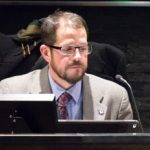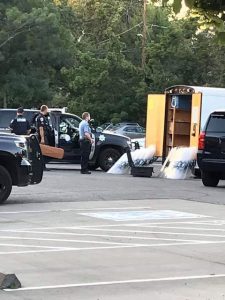by Dave Waddell
In Chico’s way of government, the city manager selects the chief of police. Since the city manager, Mark Orme, takes his marching orders from the City Council, ChicoSol thought community members would like to hear from council members about their priorities for the selection of Mike O’Brien’s successor.

Mayor Ann Schwab
O’Brien retired last week after five years as chief. His deputy, Matt Madden, is serving as interim chief.
All seven council members were asked to answer three questions via email and given a week to do so. ChicoSol received responses from five councilors – Sean Morgan, Scott Huber, Alex Brown, Ann Schwab and Randall Stone. Karl Ory and Kasey Reynolds did not respond.
1. What is No. 1 on your priority list in the (city manager’s) selection of the next chief of police?
SCHWAB: Our new chief of police must be an excellent communicator. They must be able to listen and hear the words being spoken and understand the message and the meaning. They will need to be proactive and reach out to all communities, especially those who aren’t always at the table. They need to use their communication skills to ensure alignment of the Police Department and community values.
STONE: Reformation of the Police Department.

BROWN: I am interested in a police chief that prioritizes transparent and professional communication in all interactions, is a creative and innovative thinker, and that is eager to work collaboratively with and be responsive to community needs. I would be especially excited to have a chief who has some experience with reform in other communities (in policy and police practice) and who has a commitment to equipping all officers with the highest level of professional development they can get — especially when responding to mental health crises and other unique issues.
MORGAN: Competence.
HUBER: When I met with the recruiter that the city contracted with, to provide my input on the top qualities I sought in a new chief, I stated that my priorities aligned with those promoted by Concerned Citizens for Justice of Chico. Those topics included:
–Assurance that Chico PD’s use of force policies are in compliance with state and federal law, including SB 1421, SB 978 and AB 392.
–Assure implementation of on-going officer training in implicit bias, de-escalation techniques and Crisis Intervention Team training.
— Assure implementation of a comprehensive Community Policing Plan.
— Create opportunity for greater citizen input on the Police Community Advisory Board.
2. Has the killing of George Floyd and its aftermath altered your views
on municipal policing in 2020? If so, how?
HUBER: The killing of George Floyd reinforces the need for implementation of all of my priorities for chief.

Councilor Scott Huber .
BROWN: The killing of George Floyd has simply illuminated things that have always existed regarding racism in policies and institutions, and the public is taking even more notice as a result of his murder. Our local community is demanding swift action to cultivate a definition of public safety that goes beyond law enforcement. This is something I have always believed in, but believing is not enough anymore. As a result of this outcry, I support changing our policies to restrict the use of force in police encounters; getting all officers trained in 40-hour crisis intervention and de-escalation techniques; creating more opportunities for community oversight and independent review of misconduct; forming strategic partnerships with service providers who may be better equipped to respond to certain issues; and creating better opportunities for community input around public safety. These are common sense reforms that increase accountability and transparency, and demonstrate a strong effort toward a model of public safety that is grounded in preventing future tragedies.

STONE: Yes and no. No, as I’ve been pushing for reform and oversight for seven years and been harassed and attacked since. Yes, as the need for compassionate response has never been greater. The Stonewall Alliance staging incident this week demonstrates the problem. Although likely an accident, Chico PD’s riot gear staging at Stonewall demonstrates the disconnect between community awareness and accountability to the entire community.
3. What does the term “community policing” mean to you, and would you like to see more of that in Chico?

MORGAN: Community policing, to me, is the personal connection between citizens and their police officers. Being familiar with your local officers and those assigned to “beats” in your neighborhood. I’d like to see more of it everywhere but realize it’s very difficult to accomplish. Officers don’t walk “beats” anymore. I believe former Chief Mike O’Brien did a terrific job of assigning officers and sergeants to various areas so citizens and business owners that wanted to could get to know them. In addition, the Chico Police Officers’ Association in years past has done a great job of being out in the community, supporting sporting functions, national nights out, engaging citizens. When citizens know and interact with their police force, they realize there is (generally) no need to fear these law-enforcing and abiding fellow citizens.
HUBER: Community policing means humanizing police/citizen interactions by promoting more opportunities for community members of all types (race, ethnicity, culture, socioeconomic status, etc.) and police to connect with one another in ways other than only law enforcement. It also means a return to “beat cops,” as well as foot and bike officers to reduce intimidation and increase communication. I believe our policing style must evolve in this direction to build two way respect and trust.
BROWN: Frankly, I have heard so many definitions of community policing at this point that the term is confusing. However, if I were to define it, I would describe it as a system by which police officers integrate into the neighborhoods and communities they serve, and are responsive and adaptive to local needs. This can look like more bicycle officers, officers participating in community events out of uniform, and more. I think it can go as far as meaning that the department regularly consults with a diverse cross-section of the community to identify needs and respond appropriately, or community oversight bodies where there can be a mutual exchange of ideas and recommendations regarding policing.
SCHWAB: The police chief’s communication creates community policing, providing opportunities for community members to be active allies for safe communities and enhanced quality of life in our neighborhoods. Our country’s social service approach is not addressing the root cause of our complex community problems. We need to partner with state and federal agencies to address mental illness, poverty, and housing to achieve systemic change.
STONE: Community oriented policing is an actual thing with specific guidelines and policies. I think the Stonewall incident is an example of the opposite.


I would appreciate an embedded link to an article about the Stonewall incident referred to, in this article.
The Constitution starts with the words “WE THE PEOPLE “
The Constitution does NOT begin with “WE THE POLICE “
Good people of Chico. Please do not let the police union control your beautiful college town. There are only about 100 cops. Don’t let the tail wag the dog. The police work for the people, not vice versa!